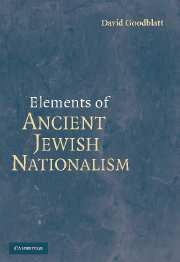Book contents
- Frontmatter
- Contents
- List of Abbreviations
- Preface
- 1 Theoretical Considerations: Nationalism and Ethnicity in Antiquity
- 2 Constructing Jewish Nationalism: The Role of Scripture
- 3 Constructing Jewish Nationalism: The Hebrew Language
- 4 A Kingdom of Priests: The Priestly Component in Ancient Jewish Nationalism
- 5 Israel Nationalism
- 6 Judah Nationalism
- 7 Zion Nationalism
- 8 Conclusions: Jewish Nationalism – What Rose and What Fell?
- Bibliography
- Author Index
- Index
Preface
Published online by Cambridge University Press: 20 July 2009
- Frontmatter
- Contents
- List of Abbreviations
- Preface
- 1 Theoretical Considerations: Nationalism and Ethnicity in Antiquity
- 2 Constructing Jewish Nationalism: The Role of Scripture
- 3 Constructing Jewish Nationalism: The Hebrew Language
- 4 A Kingdom of Priests: The Priestly Component in Ancient Jewish Nationalism
- 5 Israel Nationalism
- 6 Judah Nationalism
- 7 Zion Nationalism
- 8 Conclusions: Jewish Nationalism – What Rose and What Fell?
- Bibliography
- Author Index
- Index
Summary
The present book is the result of a decade's worth of research and reflection. Several sources inspired my interest in the topic of ancient Jewish nationalism. One was the work of Fergus Millar that culminated in his book The Roman Near East 31bc–ad337 (Cambridge, MA/London: Harvard University Press, 1993). Another was (partial) exposure to the mass of social scientific research on collective identity, ethnicity, and nationalism. Once I began pursuing this interest, I benefited greatly from the work on the topic by Doron Mendels, Shaye Cohen, and Seth Schwartz. As the reader will see from the footnotes, numerous other scholars contributed through their publications to the advancement of my project.
My primary focus will be on the province of Judah (Yehud, Ioudaia) of the Achemenid, Ptolemaic, and Seleucid empires, on (nominally) independent, Hasmonean–Herodian Judah, and on the Roman province of Iudaea. Occasionally I will also look at the situation among the Jews of the Diaspora, and occasionally I will take the discussion into the later Roman period. The later period will also come into play in the final chapter where I discuss theories of the “fall” of Jewish nationalism after 70 or 135 c.e. Given my focus on Judah and its residents, I considered using the phrase “Judean nationalism,” rather than “Jewish.” The ancient languages all had only one word to denote the human subjects of this study: (in the singular) Hebrew yehudi, Aramaic yehudai, Greek Ioudaios, and Latin Iudaeus.
- Type
- Chapter
- Information
- Elements of Ancient Jewish Nationalism , pp. xiii - xviPublisher: Cambridge University PressPrint publication year: 2006

